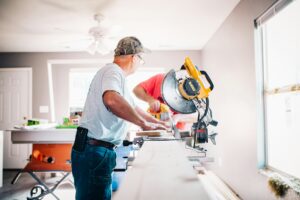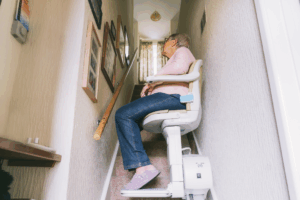
By Tyler Plack
Tyler Plack is the President of South River Mortgage. Tyler holds an active FHA Direct Endorsement (DE) underwriting certification and is the author of The Retirement Solution: Maximizing Your BenefitTyler is a seasoned entrepreneur and real estate investor renowned for his expertise in reverse mortgages and his commitment to addressing seniors' equity challenges. Tyler brings a unique perspective to his ventures, having built several successful companies throughout his career. His insights are frequently sought by industry publications, where he is recognized for his vast knowledge in the realm of reverse mortgages.
An avid investor in income-producing properties, Tyler is dedicated to helping seniors navigate their financial needs with compassion and expertise. When Tyler is not helping solve America's retirement crisis, he is a skilled pilot flying airplanes for fun.
Your home has served as your sanctuary for years. If you’re an older adult who intends to stay in your home for the rest of your life, it’s important to keep it in good repair.
Home repairs (and essential upgrades like replacement HVAC units) can be costly, and you might understandably be concerned about funding them during retirement. A home equity conversion mortgage (HECM) offers one way to cover costs.
Why Home Repairs Matter More in Retirement
Keeping your home in good shape gets harder—and more important—as you get older. Small problems like leaks, wiring issues, or roof wear can turn into big, expensive repairs if they’re ignored.
At the same time, many retirees live on a fixed income, so large surprise bills can be stressful.
A HECM gives you a way to handle these repairs now instead of waiting until they become emergencies.

What Is a HECM?
If you’re an older homeowner, you’ve likely built substantial equity in your home over the years. If you are retired or living on a fixed income, you might wish that you could tap into some of that equity to fund everyday expenses, including essential repairs.
Borrowing against that equity is easier than you may think. Many seniors choose to take out a reverse mortgage, and the most common type of reverse mortgage is a home equity conversion mortgage (HECM).
With a traditional mortgage, you make monthly payments that gradually decrease the loan balance over time. With a HECM, the lender sends you monthly payments (or a lump sum), and each payment increases the loan balance.
The loan balance comes due when one of the following happens:
- You pass away
- You sell the home
- You move out of the home
After your death, your heirs may sell your home to pay off the loan balance. If they prefer to keep the home, they may pay the balance themselves.
How a HECM Can Help You Stay in Your Home Longer
A HECM isn’t just a way to cover repairs—it’s a tool that can help you age in place comfortably.
By turning part of your home’s value into cash, you can make the upgrades needed to stay safe and independent, such as:
- Fixing steps or uneven floors to prevent falls
- Updating bathrooms or kitchens for accessibility
- Improving heating and cooling for comfort
With the right upgrades, you can avoid the high cost of moving into assisted living and stay in the home you love.
How a HECM Can Help with Home Repairs and Upgrades
When you have a HECM, you don’t have to make monthly payments like you would with a traditional mortgage. As long as you uphold your end of the loan terms — like paying your property taxes and maintaining homeowners’ insurance — you’ll continue to receive payments from the lender.
A HECM doesn’t restrict how you use the funds from your reverse mortgage. You may find that the money helps you afford key repairs and upgrades like these:
Plumbing Upgrades
Whether your home has its own septic system or connects to the city sewer, pipes can wear out, break, or become inefficient. This can lead to backups when you least expect them.
Upgrading your plumbing can be costly, but it can prevent serious problems down the line. It also grants you the peace of mind that only comes with knowing that you (probably) won’t encounter a sudden sewage overflow.
Replacement Appliances
Most home appliances last about 10 to 15 years, so you may find yourself buying a new stove, fridge, washer, and dryer over time. Whether you choose to replace appliances as they wear out or update them all at once, a HECM makes replacement significantly easier.
Age-Related Modifications
If you start to experience mobility challenges, you might decide to outfit your home with a stair lift, grab bars, wheelchair ramps, and other modifications. These can quickly become very costly.
Electrical Updates
Older homes tend to experience electrical issues over time. These problems aren’t just inconvenient — they can also be dangerous. Smaller repairs often aren’t terribly expensive, but if your entire home needs to be rewired, you may owe upwards of $10,000.
Roof Repairs or Replacements
Roofs don’t last forever, and most homes will need periodic roof repairs. However, if your roof has multiple issues or the cost of repairs is approaching that of a new roof, it might be time to consider replacement.
Example – Using a HECM to Cover Major Repairs
Let’s look at George and Helen, both age 70. Their home is worth $500,000, and they own it outright.
They take out a HECM and choose a line of credit worth about $250,000.
Over the next few years, they use the funds to:
- Replace their roof ($15,000)
- Update plumbing and wiring ($10,000)
- Install a stair lift and grab bars ($8,000)
Even after those repairs, they still have over $200,000 available for future needs.
They make no monthly mortgage payments, and their home remains their own.
Are You Eligible for a Reverse Mortgage?
(Find out in 60 seconds)
Who Qualifies for a HECM?
If you are aiming to age in place, a HECM can be an attractive option. However, it may not be the right option in every circumstance. These are some of the key qualifications:
- Be 62 or older
- Own your home outright or have significant equity
- Keep the home as your primary residence
- Meet credit and income requirements
- Continue to pay property taxes, insurance, and other costs of homeownership
- Be free of delinquent federal debt (like unpaid taxes)
You must also complete loan counseling with an agency approved by the U.S. Department of Housing and Urban Development (HUD).
Tips for Planning Home Repairs With a HECM
- Start with a home inspection. It helps you see what needs fixing now and what can wait.
- Get a few estimates. Compare bids before choosing a contractor.
- Keep receipts and records. They’ll help show the lender the funds were used responsibly.
- Prioritize safety first. Fix hazards like wiring, leaks, or mobility issues before cosmetic upgrades.
Using your HECM wisely ensures your home stays safe and comfortable for years to come.
Not Sure Whether a HECM Is Right for You?
Making the right financial moves is critical for building a peaceful, secure retirement. The South River Mortgage team can discuss your situation and help you decide whether a HECM might provide the future you need. Get in touch today to learn more!
FAQ – Using a HECM for Home Repairs
Can I use a HECM to remodel my kitchen or bathroom?
Yes. You can use the funds for any purpose, including upgrades, repairs, or remodeling.
Do I have to take all the money at once?
No. You can choose a lump sum, monthly payments, or a line of credit that grows over time.
What if I already have a small mortgage?
The reverse mortgage will first pay off what you owe, and you’ll receive the rest of the funds.
Will I still own my home?
Yes. You keep the title and can sell or move at any time.
Are there limits on how much I can borrow?
Yes. The amount depends on your age, home value, and current interest rates. Our calculator can give you an instant estimate.




